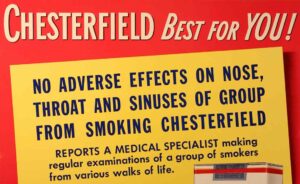The tobacco industry has knowingly put millions of lives at risk for decades by continuing to actively market cigarettes and smoking, despite being aware of the harmful health effects of inhaling nicotine and other additives into the lungs.

The tobacco lawsuit team at Shepard O’Donnell helps clients with lung cancer due to smoking in Massachusetts obtain justice from tobacco companies for their injuries. We feel strongly about making tobacco companies pay for the grievous harm they have inflicted on individuals and families and are committed to holding them accountable for their actions. Read more about our landmark $43.1 million verdict.
Below are some common questions we are asked about tobacco litigation.
Q: Can I Still File a Tobacco Lawsuit in Massachusetts?
A: Yes.
As it becomes more difficult to file tobacco suits in other states, Massachusetts remains a viable place to bring your tobacco lawsuit. If you or your loved one developed lung cancer or died as a result of smoking in Massachusetts, you may be successful in suing the tobacco company that caused your injuries. Although these cases can be long and complicated, favorable verdicts do happen, even today.
Q: I Live Outside of Massachusetts; Can I File a Tobacco Case?
A: Maybe.
As Massachusetts tobacco lawyers, Shepard O’Donnell is only accepting cases in which the majority of a victim’s smoking history took place in Massachusetts. If you live in another state but started smoking in Massachusetts and spent a significant amount of time here, please reach out to us for a free case evaluation to see if we can help.
Q: Is This a Class Action?
A: No.
The courts have made it more difficult in recent years to file class action suits against Big Tobacco because the class is so big, involving victims nationwide. As a result, tobacco lawsuits are filed on behalf of an individual and/or their family, and each is considered as a separate claim.
Q: Haven’t All Tobacco Cases Been Settled By Now?
A: No.
Big Tobacco vigorously defends its own interests and does not typically settle lawsuits brought against it. With millions of victims still suffering and dying from lung cancer due to smoking, there are potentially many more suits to be filed. Although the Attorneys General from 52 states and territories signed the Tobacco Master Settlement Agreement in 1998, that agreement does not mean that all cases are settled.
Q: My Loved One Died From Lung Cancer Due to Smoking; Can I File a Suit on His/Her Behalf?
A: Yes.
Depending on the specific details of the claim, surviving family members may be able to file a lawsuit on behalf of their loved one. It’s best to contact experienced tobacco lawyers to discuss your case so they can advise you on the best course of action. Shepard O’Donnell offers free case evaluations for individuals and families who have been affected by lung cancer due to smoking in Massachusetts.
Q: Don’t Companies Have a Legitimate Defense Because of the Warnings on Packaging?
A: No.
The relatively strong warnings that we see on cigarette packaging today weren’t mandated by the government until 1998, but by then, millions were already addicted. Before that, warnings were vague and ineffectual: The Federal Cigarette Labeling and Advertising Act of 1965 required that the warning “Caution: Cigarette Smoking May Be Hazardous to Your Health” be placed in small print on one of the side panels of each cigarette package. This was not enough to deter people from smoking, or to adequately warn about the health risks known to the tobacco companies but hidden from the public.
Even with these warnings, tobacco companies continued their aggressive – and deceptive – marketing tactics, effectively contradicting their warnings.
Q: Is it My Own Fault For Starting to Smoke in the First Place?
A: No.
Tobacco companies knew exactly what they were doing when they got millions of people hooked on nicotine. They intentionally marketed to young people and teens, using sexy and fun imagery to convey the idea that smoking was exciting and cool. Think of the Marlboro Man and the cartoon Joe Camel in cigarette ads, or even Sean Connery’s James Bond or Audrey Hepburn on the big screen, looking glamorous through clouds of smoke.
A much more insidious tactic involved handing out free sample packs of cigarettes to children as young as eight years old. Their plan—-a successful one as it turns out—-was to turn these children into addicts and lifelong tobacco consumers.
In a 1953 confidential report for Philip Morris, the researcher writes: “Studies of clinical data tend to confirm the relationship between heavy and prolonged tobacco smoking and incidence of lung cancer.” Did that stop companies from marketing to an impressionable audience? No.
Executives at Big Tobacco knew they had to keep smokers hooked and actively fought back against information that showed smoking was bad for your health. In 1964, after reading the Surgeon General’s Report on the dangers of smoking, internal communications at the highest levels at Philip Morris International revealed a chilling plan: “We must in the near future give smokers a psychological crutch and a self-rationale to continue smoking.”
According to the industry watchdog, Expose Tobacco, the industry “ran deceptive campaigns, misled policymakers even when under oath, and paid for biased research to help create confusion. The longer the truth was withheld, the more people smoked, unaware of the damage it was causing to their bodies.”
Millions of people have fallen victim to the deceptive marketing practices of tobacco companies and have paid a deadly price.
Q: I Smoked Menthol Cigarettes, Is That Different?
A: No.
Menthol cigarettes were invented and designed by the tobacco industry because research showed they were easier to smoke. Menthol numbs the cough reflex, which allowed even people who were sensitive to regular cigarettes to take up smoking. This is yet another example of how Big Tobacco actively sought to “recruit” more smokers.
Marketing of menthol cigarettes was heavily targeted towards African American teenagers and children since studies showed that 85% of Black smokers preferred menthol cigarettes. According to a 2022 NPR report, “tobacco industries specifically found influencers in Black communities and gave them free samples, to build markets surreptitiously. The companies also sponsored events like the Kool Jazz Festival, that included an ad of Dizzy Gillespie next to a pack of Kools.”
Menthol enhances nicotine’s addictiveness and the flavor makes the cigarettes “easier” to use and because of this, they were acknowledged by the industry as great “starter products.” Menthol cigarettes weren’t banned in Massachusetts until 2020!
These are just a few of the questions that we are asked on a regular basis by victims of lung cancer due to smoking. Stay tuned for Part II of our blog, which will be released shortly. We will answer seven more commonly asked questions about suing tobacco companies for financial compensation.








